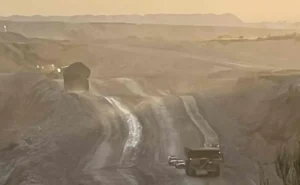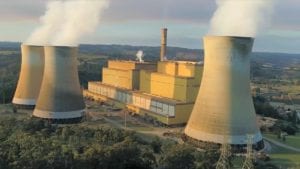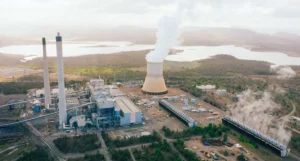If you read the headlines from the latest Intergovernmental Panel on Climate Change (IPCC), you probably felt a jolt of entirely justified panic. The gargantuan collation of scientific evidence proves inarguably that greenhouse gas emissions are warming the Earth. A collection of international disasters has dominated media over the past few months, notably including a catastrophic bushfire on the Greek island of Evia. Footage of the evacuations from that island were immediately evocative of photographs of the 2019-20 Black Summer bushfires.
Reading the IPCC report, and the coverage of it around the world, it tells half a story. Much of the attention is on the impacts of climate change, both historical, present-day and in the future. The failures of the past two decades to bring down emissions are harrowing. This is somewhat inevitable – the report is the first of three reports within the IPCC’s sixth assessment cycle, focusing on physical science (working group one). Working group two, due out next year, will look at adaptation, and working group three, also due next year, looks crucially at mitigating climate change.
It is the mitigation component of climate that looms largest for Australia. Domestic emissions are continually rising, though the data is presented with a layer of ‘land use changes’ to obscure that rise. Australia’s fossil fuel exports have been dented by Covid19, but massive volumes of coal and gas continue to be exported overseas. When they are burned in their destination country, they cause climate impacts in total volume many times greater than Australia’s domestic emissions.
None of these things are particularly surprising. Nor is it surprising that this terrible state of affairs has been worsened by Australia’s current government. 2020 was dedicated to using the Covid19 crisis as a cover for funnelling massive quantities of taxpayer subsidies towards fossil fuel projects, particularly gas plants and gas mining.
What is perhaps more striking, and more important, is the deeper and more insidious state of denial that exists far deeper than just malfeasance from a notoriously poor-performing government.
The cultural, political and corporate problems that exist at a wider level to help sustain Australia’s emissions problem can be detected in quite a few different places.
Consider a very recent example. When a turbine at a Queensland coal-fired power station catastrophically failed, sending bits of turbine blade shooting through the roof, it was clearly not economical to repair. Coal power is comfortably the largest single technological cause of greenhouse gas emissions within Australia. The International Energy Agency (IEA) recently identified the closure of coal by 2030 in developed countries as a baseline for achieving net zero emissions by 2050, and limiting warming to 1.5 degrees celsius.
The coal plant explosion served as a simple test – what would the Queensland government replace the destroyed turbine with? Another turbine running off coal would signal that the claimed goal of ‘net zero by 2050’ is not held sincerely or seriously. Replacing that unit with renewables and storage, running at zero greenhouse gas emissions, would signify seriousness.
Not only did the state government owners choose to keep the coal unit running, the federal opposition leader Anthony Albanese openly declared it in a Facebook post.
The problem isn’t just political and regulatory. Australia’s businesses are not doing good job of aligning with ambitious climate goals. The ClimateWorks Australia Net Zero tracker has been assessing various sectors over the past year, and each report is a damning indictment of companies failing to set clear, substantial short-term targets to reduce emissions.
Their dive into the energy sector, comfortably the most exposed to high emissions activities, found that “overall, energy sector commitments are insufficient for Australia to achieve a Paris-aligned transition to net zero”. Only one company, Engie, is “partially aligned”. 14 companies, including AGL, EnergyAustralia and Origin Energy, are “not aligned”, and five have set no targets of any kind. No companies are ‘aspirationally’, closely or fully aligned with a net zero by 2050 pathway.
You don’t have to roam far to find proclamations that businesses are ‘taking the lead’ on climate action, or picking up the slack of a laggard government. But even a cursory examination of their goals – not even their capital allocation or coal retirement plans – shows the clear absence of any intent to actually decarbonise their companies in line with ambitious climate goals.
The IPCC report does not explicitly address mitigation, but it shows what mitigation does.“It is virtually certain that global surface temperature rise and associated changes can be limited through rapid and substantial reductions in global GHG emissions”, the report says. “Without net-zero CO2 emissions, and a decrease in the net non-CO2 forcing (or sufficient net negative CO2 emissions to offset any further warming from net non-CO2 forcing), the climate system will continue to warm”.
That’s a very complicated way of saying that emissions need to be cut immediately, because the problem doesn’t stop getting worse until we turn the tap off completely. The IEA’s May net zero report put the hard science into simple realities. Fossil fuel exploration needs to cease immediately. Coal power, the biggest yet most readily toppled cause of climate change, has to be eliminated from human society as soon as possible – definitely by 2030, in rich countries like Australia. Wind and solar have grown incredibly fast over the past decade, but they must grow around three times as fast in the next two. The sales of combustion engines needs to stop – everywhere on Earth – by 2035.
None of these are easy, but all of them are easier than the physical impacts that will dominate our lives if we decide not to do these things. This is what is meant when climate activists talk about an ’emergency’. Like Ciovid19 quietly spreading through an oblivious community, the impacts of fossil fuels build up in the background. Unlike Covid19, there is no society-wide understanding of the harm accumulating due to the absence of any emergency response in the short term, or any systemic and structural response in the long term.
Can Australia ride through what is increasingly becoming a year as significant for climate change as 2019, with its major global climate strikes and marches around the world? Deeper cultural change, led by government but realised by all political parties, businesses and citizens, will be required to achieve ambitious emissions cuts in Australia. The new IPCC report puts hard numbers on what happens to us if that project fails.









